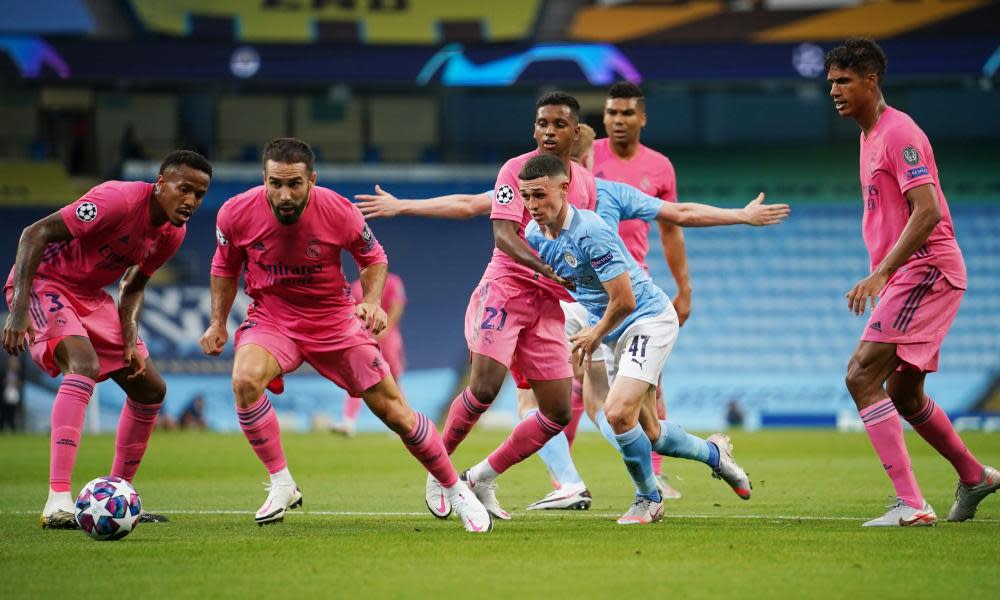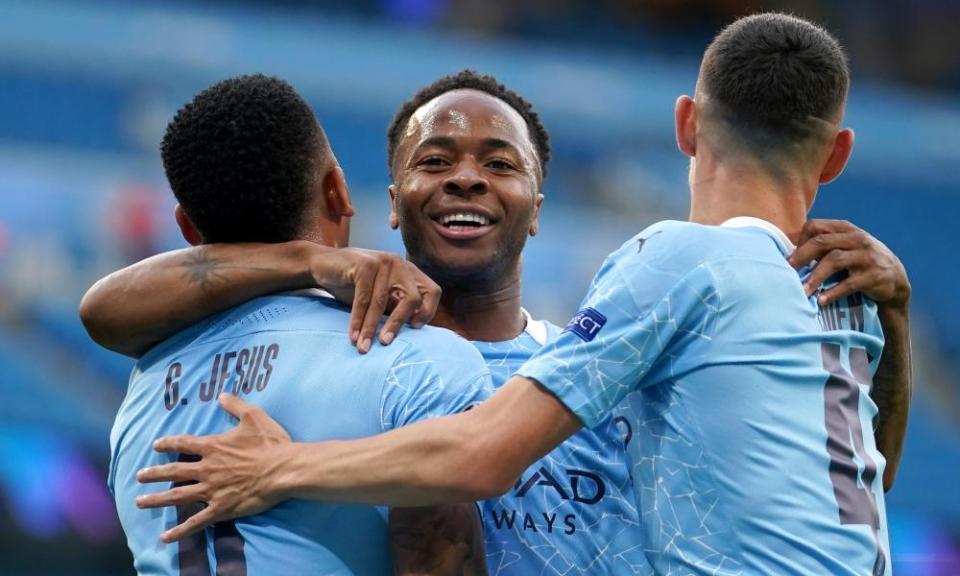Phil Foden stars to offer Manchester City glimpse of multiple futures

Not long after Pep Guardiola arrived at Manchester City in the summer of 2016, a few of the academy players were invited to train with the first team during pre-season. Afterwards, Guardiola was almost beside himself with excitement. “Did you see that kid in the centre of the field?” he asked his staff incredulously. He liked the look of Brahim Díaz. He liked the look of Jadon Sancho. But it had taken just one session for Guardiola to fall in love with Phil Foden.
Still, the course of true love rarely runs in a straight line. And four years after Pep from Catalonia first clapped eyes on Phil from Stockport across a crowded rondo, here finally was the consummation. Not a dead rubber against Hoffenheim. Not a Carabao Cup final against Aston Villa. Not a casual league game against a half-bothered Liverpool.
But a Champions League knockout game against Real Madrid. Ahead of Bernardo Silva, ahead of Riyad Mahrez, ahead of David Silva, whose place he is taking. If it felt like a passing of the torch, then on a night of silent jubilee for City it was also a liminal moment for Foden himself: the point at which he stopped being potential. When he stopped being the future and became the present.
Related: Jesus ensures stylish Manchester City sweep past Real Madrid
And not in his favoured midfield role, either but as a false No 9: the sort of role Guardiola only hands to his chosen, crystalline few: Mario Götze at Bayern Munich (less successfully), Lionel Messi at Barcelona (a little more so). Where Foden eventually ends up on that sliding scale is a game of pointless conjecture. But it speaks volumes of Foden’s versatility, technical ability, effortless aggression and tireless running that Guardiola felt that this was the time to find out.
It’s one of Foden’s curiosities that, 74 games into his City career, we still don’t really know what his best position will be. He is played as a wing-back and a deep-lying playmaker for England age-group sides. Guardiola’s claim that he “fits all the positions up front” offers a glimpse of several tantalising futures: an advanced No 8 darting into the half-spaces, a slaloming winger putting lumpen defenders on their backsides, or even a sneaky centre-forward, using his boundless energy to lead the press and force mistakes.
Thus it was here, with Foden reprising the centre-forward role popularised by David Silva at Euro 2012, despite being 5ft 7in and no one’s idea of a target man. It was, in short, the most Guardiola selection imaginable: his own inimitable way of turning up his nose at the old-money squares in the opposing dugout, like going to a white-tie ball in a CBGB T-shirt. It also suggested that Guardiola sensed where Real were most vulnerable: not in the usual midfield theatre but in defence, where the absence of the suspended Sergio Ramos offered an opportunity for City to win the ball high up the pitch.

In this respect, at least, Foden did his job admirably. The fact that both City goals came from burgling possession in the final third indicated how successfully City managed collectively to disrupt Real’s buildup play. He may have had fewer touches than any City player, the lowest passing accuracy of any of their outfield starters, but in many ways that barely scratches at his importance.
Without the ball, he was often the furthest player forward, harrying Raphaël Varane and Éder Militão and cutting off the supply to Casemiro (all of whom had wretched games). When City won the ball, meanwhile, he dropped back, slipping between the lines, demanding the ball and laying it off economically.
It wasn’t a natural role for him. He is not the most instinctive penalty-area poacher, lacking the intelligent, contoured running that Sergio Agüero, Gabriel Jesus and Raheem Sterling offer as standard. But with some coaching, who’s to say he cannot get there eventually? Foden has now offered too many assured performances in big games to suggest his progress is accidental.
And yet it has come at such a measured and rational rate that there seems nothing very unusual about an uncapped 20-year-old English midfielder being asked to step up in the Champions League last-16 against Real Madrid. But it underlines his greatest achievement: to bide his time, to keep his head above water, to keep believing that eventually, one of the greatest club squads ever to grace the English game would find a regular role for him.
Díaz, now at Real, was an unused substitute for this game. Sancho’s Dortmund had already been eliminated from the competition. Meanwhile, midway through the second half the board went up. Foden was off. Bernardo SIlva was on. “He has to wait his turn,” Guardiola said of him last season. On a sweltering night in Manchester, it felt as if Foden’s turn had finally come.


